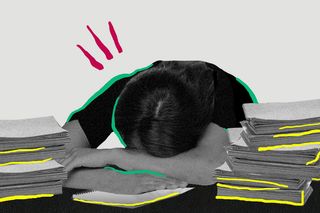
Why People Living With ADHD Are Often Misjudged As ‘Lazy’
Many neurodivergent people experience a sense of “paralysis,” where they want “to get started” with work but are “unable to make progress.”

“When I was in school, there were plenty of times I was told that if I just applied myself, I could have done so much more. I could have done so much better…,” William Curb, an individual living with Attention Deficit Hyperactivity Disorder (ADHD), says on the podcast The Myth of Lazy.
“Let me tell you, this is a great way to internalize the idea that I’m lazy,” Curb adds.
ADHD falls under the “neurodivergence umbrella,” alongside autism, dyslexia, dyspraxia, OCD, among others. “Neurodivergent” is a term used for an individual whose “brain processes, learns, and/or behaves differently from what is considered ‘typical.'” One of these differences manifests as “executive dysfunction” for people living with ADHD — as well as for autistic individuals. And this is precisely why autistic individuals and people living with ADHD can struggle to even get started with things they’re supposed to do — let alone fulfill the neurotypical expectations of “productiveness.”
To understand what is dysfunctioning, it’s important to learn what executive functioning is. It is a set of cognitive processes that enable people to manage life by strategizing, organizing, making decisions, paying attention to the details, exercising self-control — basically everything that is required to help people get started on a task and see it through to completion.
So, executive dysfunction can lead individuals to “experience a sense of ‘paralysis’” in the face of a task or project; that is, they want to get started, but are “unable to make progress forward in any manner.”
Look at it this way: a company has x number of projects it must do, and it has y number of departments brimming with skilled, enthusiastic workers geared up to do the work. However, all of the company executives — across departments — are on leave. So, no one knows how to prioritize the projects or distribute them across departments; or how to organize the tasks and strategically delegate them; and how to manage the workers, guide them, and supervise the work they’re doing even if they do somehow manage to get started. It sounds like a lot, right? But that’s exactly how living with an “ADHD brain” feels like — running a company without executives.
“[W]e can get ‘paralyzed’ when we’re thinking too far ahead… With ADHD, we tend to be great at looking at the big picture of things, but can have a lot of trouble executing those small steps,” Curb explains.
Related on The Swaddle:
Having a Sense of Purpose in Life Helps Improve Memory, Shows Study
Moreover, working memory — or “temporary sticky notes” in the brain that aid decision-making and behavior by helping us remember what’s on our plate, among other things — is also a part of executive functioning. So then, a dysfunction means one may constantly lose track of their responsibilities, or fail to organize their time accordingly.
Interestingly, the difficulty in “getting started” with things isn’t a matter of preference either. People may be equally unable to do things they genuinely like, as compared to things they may not typically want to do — like performing household chores, making presentations for work, or even, just getting out of bed and going to work.
For instance, even if I really want to watch a specific movie at a theatre, the process of choosing a day that would work, a theatre that would be the most convenient, the seats I would like, and so on, account for a series of small steps — all seemingly easy to execute, and yet too many in number to overwhelm me into a state of “paralysis.” And that’s precisely the reason why I never made it to watch Dune at a theatre. It’s also the reason why, much before I even realized I was neurodivergent, that I decided to always go to theatres alone; coordinating with someone added more steps to the process than my neurodivergent brain could handle.
However, it is pertinent to note for individuals living with ADHD, it can, nonetheless, be relatively easier to “perform a task” that is “stimulating and interesting” — like, researching on a subject of their special interest — as opposed to one that is “tedious and repetitive”– like, reviewing an excel sheet. A propensity to get bored easily, and the low attention-span people with ADHD often deal with (it’s literally named “attention deficit”), play a role here. The tedium makes it difficult to stay alert while performing a task that isn’t mentally stimulating; the chances of getting distracted about a million times — by anything from the sound of a bird chirping outside the window, to the blinking notification on the phone, to even the passing thought of your favorite food — are quite high.
Researchers involved in a 2017 study in The Lancet Psychiatry found structural alterations in several brain regions of people living with ADHD. They believe this could be responsible for the “low motivation” people with ADHD often face. A study from January also suggests that lower levels of dopamine may be behind it too by “affect[ing] reward centers in the brain, causing a lack of enthusiasm for starting, or completing tasks.”
Related on The Swaddle:
What The ‘Spoon Theory’ Means for People Living With Chronic Illnesses, Disabilities
Thomas Brown, director of the Brown Clinic for ADHD in California, quotes his patient, who used a sexual example to explain this quandary. “It’s like having ‘erectile dysfunction of the mind.’ If the task you’re trying to do is really interesting to you, you’re ‘up’ for it and you can perform. But if it doesn’t turn you on, you can’t ‘get it up.’ And it doesn’t matter how much you say to yourself, ‘I want to, I need to, I should,’ you can’t make it happen because it’s just not a willpower thing!”
To neurotypical individuals, however, someone experiencing executive dysfunction, lack of motivation, or rampant distraction can seem “lazy” — a word often associated with a lack of drive and effort to get things done. Moreover, since the tendency to get distracted easily can also lead to careless errors, the takeaway is the individual just doesn’t care about the task they’re doing. But really, a person with ADHD “may try really, really hard but still can’t tackle what they want to accomplish.”
However, calling people living with ADHD “lazy,” while common, is also really harmful. First, “the label of lazy can make us feel trapped because there’s no cure for lazy,” Curb says. Second, it can worsen the feelings of “self-loathing that inevitably arises from repeating the same mistakes over and over again, losing things over and over again, and feeling hopelessly incapable of succeeding at even the simplest of tasks… over and over again.”
It’s also counterproductive, as Melissa Orlov, author of The ADHD Effect on Marriage, explains. How exactly is one supposed to “try harder” when their brain is already trying really hard to perform steps that many neurotypicals just glide through?
Calling people with ADHD “lazy” furthers ignorance about the way many neurodivergent individuals process things. Society, at large, doesn’t even acknowledge many of the hurdles an “ADHD brain” faces because getting through these “steps” can be so seamless to so many neurotypical brains that they don’t even register them in their consciousness.
“[People with ADHD] exert as much effort as those without [ADHD], but their condition keeps them from getting to the finish line because they’re easily distracted along the way,” another article sums it up.
“They’ll eventually get there, it will just take a little longer… One way to think of it: these folks will get a whole lot done — while they’re supposed to be doing something else.”
Devrupa Rakshit is an Associate Editor at The Swaddle. She is a lawyer by education, a poet by accident, a painter by shaukh, and autistic by birth. You can find her on Instagram @devruparakshit.
Related


What It’s Like To Live With: Fibromyalgia
